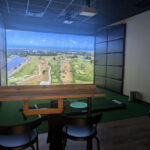Article Written by Sofia Korol. Photo by Sofia Korol.
The traditional way of learning is through textbooks, Google, and all kinds of visual materials, and that has its place in the classroom. To be able to turn factual material into something “living” students need to visit places and experience with their own eyes how people live and work, and this enlivens the whole learning process. It can also give the student new or different ideas that further deepen the understanding. Being able to listen to and then ask questions of experts at the sites visited further deepens this understanding, absorbing first-hand accounts of events and happenings.
Being on the British campus of SCSU and studying the subject BRIT 201 – Reflections on the British Cultural Experience, students have the opportunity to go on educational trips every Friday.
According to teacher David Young, this experience will be beneficial in developing empathy for people with whom the student may not have had previous knowledge or interest, offering new perspectives on the UK and Europe through the study and analysis of cultural characteristics associated with certain communities or countries. Also, students will be able to challenge the generally accepted views/viewpoints of these countries and their home countries.
“Students can learn to identify, explore and empathize with different cultural traits and contrast them with their own cultural identity. The resulting understanding can provide a new way of looking at important issues that might otherwise be overlooked,” David shares his experience.
As part of the course, students have the opportunity to visit many new British cities:
York is an atmospheric city in Great Britain, where woven streets, medieval buildings and the impressive York Cathedral intertwine history and modernity.
“My highlight is York. When we first arrived, I immediately noticed how it felt to me like the epitome of an English city that you see in movies. I thoroughly enjoyed even just walking through the streets and seeing the old beautiful buildings, and trying to fathom the fact that I was walking along streets in a city that was originally founded 2000 years ago by the Romans. Especially impactful for me was York Minster. Just walking through the church I felt strangely at peace and emotional at the same time. Being able to watch and listen in for the Evensong service was a similar calm and meditative experience that I will never forget,” student Ailee Miller shares her impressions.
Edinburgh is an ancient Scottish city, nestled among mountains and hills, with impressive architecture and cultural richness. Berwick is an attractive coastal town with beautiful sea views and ancient architectural gems. Durham is famous for its magnificent cathedral and charming river, creating a unique setting. Lindisfarm is a quiet town in the west of England, known for its historic atmosphere and the famous Lindisfarm Abbey Church. Beamish is a picturesque village surrounded by natural beauty and architectural treasures. London is the beating heart of Great Britain, a metropolis of endless possibilities, where grandeur and cultural diversity combine.
“This is my favorite city. This is one of those English places that truly convey the atmosphere of England. Especially during Christmas. It’s like you’re on Diagon Alley from Harry Potter,” says student Valentyna Kamienieva about London.
Students also have the opportunity to visit Woodhorn, and Morpeth – small English settlements that leave with their unique atmosphere and charm. Hulne Park offers serene landscapes and historical charm in Northumberland. Newcastle is a vibrant city in northeast England known for its historic architecture and lively culture. Hadrian’s Wall, a UNESCO World Heritage site, is a Roman fortification that once marked the northern boundary of the Roman Empire, while Hexham is a charming market town nearby. Pegswood is a small village in Northumberland, Warkworth boasts a medieval castle and Holy Island features Lindisfarne Castle and is accessible by a causeway. Bamburgh is renowned for its stunning castle overlooking the Northumberland coast, and the Angel of the North is an iconic contemporary sculpture near Gateshead.
David Young in his class offers a new adventure that can shape and change your views and philosophies in the future. From the start, he says, students grow in self-confidence, as well as in their thinking and understanding of the cultural differences (and similarities) that make our countries what they are today. Students bond with fellow students both socially and academically, and new friendships are made.
Class presentations and written assignments encourage natural authority in what students say and write. Interaction with fellow students offers opportunities and approaches to cooperation. The class offers intellectual stimulation and intellectual and social challenges that, with persistence and intensity, will energize and engage the student in a way unlike any previous experience. This will help the student develop as a person in such a way that s/he looks at problems and approaches them. These experiences abroad can be very profound and can continue to influence students for the rest of their lives.
To sum up, excursions at the university are an important component of the educational process. They offer a range of benefits, from hands-on learning and improved academic understanding to life skills development and increased cultural awareness. By allowing students to step out of the classroom and into the real world, universities can enrich their education and prepare them for a successful future.






Recent Comments